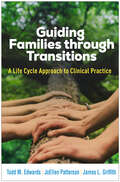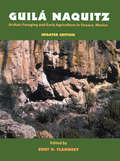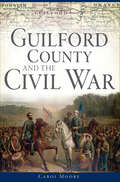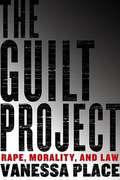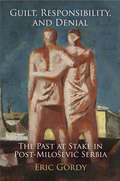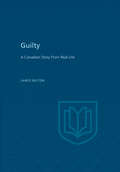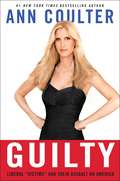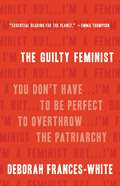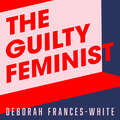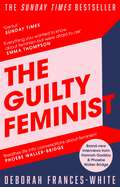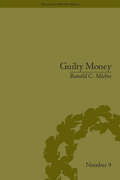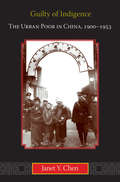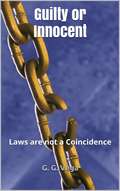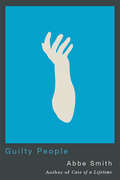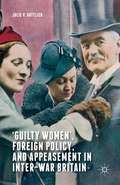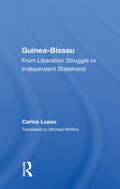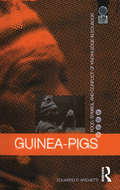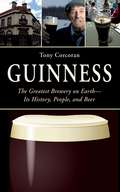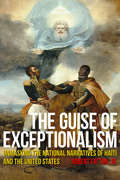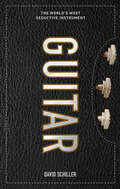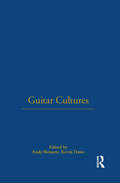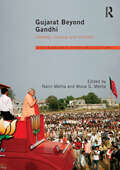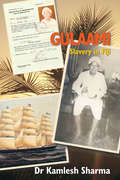- Table View
- List View
Guiding Families through Transitions: A Life Cycle Approach to Clinical Practice
by Todd M. Edwards JoEllen Patterson James L. GriffithAn indispensable clinical resource and text, this book offers therapists evidence-based strategies to support families through life's inevitable transitions. Chapters explore typical life cycle stages--couple formation, parenthood, adolescence, young adulthood and midlife, and later life--and describe treatment principles for frequently encountered family challenges. The book normalizes developmental strains and underscores the significance of flexibility, adaptability, and resilience through adversity. Extensive case examples encompass a range of family forms, cultural and individual differences, and life cycle disruptions, including parental separation, illness, and loss.
Guila Naquitz: Archaic Foraging and Early Agriculture in Oaxaca, Mexico, Updated Edition
by Kent V. FlanneryThis volume reports on the excavation of Guilá Naquitz cave in Oaxaca, a site that provides important evidence for the earliest plant domestication in the New World. Stratigraphic studies, examinations of artifactual and botanical remains, simulations, and an imaginative reconstruction make this a model project of processual archaeology.
Guilford County and the Civil War (Civil War Series)
by Carol MooreGuilford County residents felt the brutal impact of the Civil War on both the homefront and the battlefield. From the plight of antislavery Quakers to the strength of women, the county was awash in political turmoil. Intriguing abolitionists, fire-breathing secessionists, peacemakers, valiant soldiers and carpetbaggers are some of the figures who contributed to the chaotic time. General Joseph E. Johnston's parole of the Army of Tennessee at Greensboro, as well as the birth of a free black community following the Confederate defeat, brought amazing changes. Local author and historian Carol Moore traces the romantic days in the lead-up to war, the horrors of war itself and the decades of aftermath that followed.
The Guilt Project: Rape, Morality, and Law
by Vanessa PlaceAn English court in 1736 described rape as an accusation "easily to be made and hard to be proved, and harder to be defended by the party accused, though never so innocent." To prove the crime, the law required a woman to physically resist, to put up a "hue and cry," as evidence of her unwillingness. Beginning in the 1970s, however, feminist and victim-advocacy groups began changing attitudes toward rape so the crime is now seen as violent in itself: the legal definition of rape now includes everything from the sadistic serial rapist to the eighteen-year-old who has consensual sex with a fourteen-year-old. This inclusiveness means there are now more rapists among us. And more of rape's camp followers: the prison-makers, the community watchdogs, law-and-order politicians, and the real-crime/real-time entertainment industry. Vanessa Place examines the ambiguity of rape law by presenting cases where guilt lies, but lies uneasily, and leads into larger ethical questions of what defines guilt, what is justice, and what is considered just punishment. Assuming a society can and must be judged by the way it treats its most despicable members, The Guilt Project looks at the way the American legal system defines, prosecutes, and punishes sex offenders, how this Dateline NBC justice has transformed our conception of who is guilty and how they ought to be treated, and how this has come to undo our deeper humanity.
Guilt, Responsibility, and Denial: The Past at Stake in Post-Milosevic Serbia (Pennsylvania Studies in Human Rights)
by Eric GordyWhen the regime led by Slobodan Milošević came to an end in October 2000, expectations for social transformation in Serbia and the rest of the Balkans were high. The international community declared that an era of human rights had begun, while domestic actors hoped that the conditions that had made a violent dictatorship possible could be eliminated. More than a decade after the International Criminal Tribunal for the Former Yugoslavia initiated the process of bringing violators of international humanitarian law to justice, significant legal precedents and facts have been established, yet considerable gaps in the historical record, along with denial and disagreements, continue to exist in the public memory of the Yugoslav wars.Guilt, Responsibility, and Denial sets out to trace the political, social, and moral challenges that Serbia faced from 2000 onward, offering an empirically rich and theoretically broad account of what was demanded of the country's citizens as well its political leadership—and how these challenges were alternately confronted and ignored. Eric Gordy makes extensive use of Serbian media to capture the internal debate surrounding the legacy of the country's war crimes, providing one of the first studies to examine international institutional efforts to build a set of public memories alongside domestic Serbian political reaction. By combining news accounts, courtroom transcripts, online discussions, and his own field research, Gordy explores how the conflicts and crimes that were committed under Milošević came to be understood by the people of Serbia and, more broadly, how projects of transitional justice affect the ways society faces issues of guilt and responsibility. In charting the legal, political, and cultural forces that shape public memory, Guilt, Responsibility, and Denial promises to become a standard resource for studies of Serbia as well as the workings of international and domestic justice in dealing with the aftermath of war crimes.
Guilty
by Lance Bilton Douglas LochheadThis is a reproduction of a book published before 1923. A Canadian story from real life. It is part of the Toronto reprint library of Canadian prose and poetry series.
Guilty: Liberal "Victims" and Their Assault on America
by Ann CoulterJust as presidential politic hits fever pitch, Coulter's new work promises to be timely, controversial, and filled with the author's fearless penchant for saying what needs saying about politics and culture today.
Guilty: Hollywood's Verdict on Arabs After 9/11
by Jack G. Shaheen"Nothing will be the same again." Americans scarred by the experience of 9/11 often express this sentiment. But what remains the same, argues Jack G. Shaheen, is Hollywood's stereotyping of Arabs. Before 9/11, Shaheen dissected Hollywood's equation of Islam and Arabs with violence in Reel Bad Arabs, his comprehensive study of over a thousand movies. Arabs and Muslims, he showed, were used as shorthand for the "Enemy" and the "Other." In his new book about films made after 9/11, Shaheen finds the same malevolent stereotypes at play. Nearly all of Hollywood's post-9/11 films legitimize a view of Arabs as stereotyped villains-sheikhs, Palestinians, or terrorists. And this happens in every type of film imaginable: one out of four of the movies profiled here have absolutely nothing to do with the Middle East, yet producers toss in weird, shady, unscrupulous Arabs.Along with an examination of a hundred recent movies, Shaheen addresses the cultural issues at play since 9/11: the government's public relations campaigns to win "hearts and minds" and the impact of 9/11 on citizens and on the imagination. He suggests that winning the "war on terror" would take shattering the century-old stereotypes of Arabs. He calls for speaking out, for more Arab Americans in the film industry, for fresh films, and for a serious effort on the part of our government to tackle this problem.
The Guilty Feminist: You Don't Have to Be Perfect to Overthrow the Patriarchy
by Deborah Frances-Whitep.p1 {margin: 0.0px 0.0px 0.0px 0.0px; font: 12.0px 'Times New Roman'} A witty take on feminism for every woman who wants equality but sometimes wants a day off from fighting for it p.p1 {margin: 0.0px 0.0px 0.0px 0.0px; font: 12.0px 'Times New Roman'} p.p2 {margin: 0.0px 0.0px 0.0px 0.0px; font: 12.0px 'Times New Roman'; min-height: 15.0px} Sometimes we feel a bit like "I'm a feminist, but..." As in, "I'm a feminist, but I skipped the Women's March to buy face cream." As in, "I'm a feminist, but I've never found time to read Sylvia Plath (but I have watched fifteen seasons of Keeping Up with the Kardashians)." In The Guilty Feminist, Deborah Frances-White reassures us that we don't have to be perfect to be a force for meaningful change. Exploring big issues of identity, equality, intersectionality, and the current feminist agenda, she explodes the myth of the model activist and offers a realistic path toward changing the world.
The Guilty Feminist: The Sunday Times bestseller - 'Breathes life into conversations about feminism' (Phoebe Waller-Bridge)
by Deborah Frances-WhiteTHE SUNDAY TIMES BESTSELLER'Breathes life into conversations about feminism' PHOEBE WALLER-BRIDGE'Very funny, very clever, very thoughtful and very relevant' DOLLY ALDERTONWhy do we find it so hard to say 'No'?How can feminism be more inclusive?What can rom-coms tell us about taking charge?The Guilty Feminist will challenge you, reassure you and empower you to see the world differently.From inclusion to intersectionality, #MeToo to men's rights, rom-coms to pornography, Deborah Frances-White tackles urgent questions for the modern woman. Featuring interviews with activists, businesswomen and all-round inspirations, The Guilty Feminist examines how women can abandon their guilt, say No (when they mean it), say Yes (when they want to), and to change the world - and ourselves - for the better.Includes interviews with Jessamyn Stanley * Zoe Coombs Marr * Susan Wokoma * Phoebe Waller-Bridge * Hannah Gadsby * Reubs Walsh * Bisha K. Ali * Becca Bunce * Mo Mansfield * Leyla Hussein * Amika George'Genius' Sunday Times'Funny, fresh, thought-provoking' Observer'Everything you wanted to know about feminism but were afraid to ask' EMMA THOMPSON'Quite possibly the defining feminist of our generation' ELIZABETH DAY'Encouraging every woman to say: "I get to be heard. I deserve to be seen" ' Daily Express'A passionate and engaging manifesto, reminding readers that feminism isn't one-size-fits-all' I
The Guilty Feminist: The Sunday Times bestseller - 'Breathes life into conversations about feminism' (Phoebe Waller-Bridge)
by Deborah Frances-White***Coming in April 2025: Deborah Frances-White's new book SIX CONVERSATIONS WE'RE SCARED TO HAVE***THE SUNDAY TIMES BESTSELLER'Breathes life into conversations about feminism' PHOEBE WALLER-BRIDGE'Very funny, very clever, very thoughtful and very relevant' DOLLY ALDERTONWhy do we find it so hard to say 'No'?How can feminism be more inclusive?What can rom-coms tell us about taking charge?The Guilty Feminist will challenge you, reassure you and empower you to see the world differently.From inclusion to intersectionality, #MeToo to men's rights, rom-coms to pornography, Deborah Frances-White tackles urgent questions for the modern woman. Featuring interviews with activists, businesswomen and all-round inspirations, The Guilty Feminist examines how women can abandon their guilt, say No (when they mean it), say Yes (when they want to), and to change the world - and ourselves - for the better.Includes interviews with Jessamyn Stanley * Zoe Coombs Marr * Susan Wokoma * Phoebe Waller-Bridge * Hannah Gadsby * Reubs Walsh * Bisha K. Ali * Becca Bunce * Mo Mansfield * Leyla Hussein * Amika George'Genius' Sunday Times'Funny, fresh, thought-provoking' Observer'Everything you wanted to know about feminism but were afraid to ask' EMMA THOMPSON'Quite possibly the defining feminist of our generation' ELIZABETH DAY'Encouraging every woman to say: "I get to be heard. I deserve to be seen" ' Daily Express'A passionate and engaging manifesto, reminding readers that feminism isn't one-size-fits-all' I
Guilty Money: The City of London in Victorian and Edwardian Culture, 1815-1914 (Financial History #9)
by Ranald C MichieThis is an engaging study of the place occupied by the City of London within British cultural life during the Victorian and Edwardian periods. Michie uses both literary and popular novels to examine socio-economic representations during this period.
Guilty of Indigence
by Janet Y. ChenIn the early twentieth century, a time of political fragmentation and social upheaval in China, poverty became the focus of an anguished national conversation about the future of the country. Investigating the lives of the urban poor in China during this critical era, Guilty of Indigence examines the solutions implemented by a nation attempting to deal with "society's most fundamental problem." Interweaving analysis of shifting social viewpoints, the evolution of poor relief institutions, and the lived experiences of the urban poor, Janet Chen explores the development of Chinese attitudes toward urban poverty and of policies intended for its alleviation. Chen concentrates on Beijing and Shanghai, two of China's most important cities, and she considers how various interventions carried a lasting influence. The advent of the workhouse, the denigration of the nonworking poor as "social parasites," and efforts to police homelessness and vagrancy--all had significant impact on the lives of people struggling to survive. Chen provides a crucially needed historical lens for understanding how beliefs about poverty intersected with shattering historical events, producing new welfare policies and institutions for the benefit of some, but to the detriment of others. Drawing on vast archival material, Guilty of Indigence deepens the historical perspective on poverty in China and reveals critical lessons about a still-pervasive social issue.
Guilty or Innocent
by G. G. Vega Richard TaylorLaws are not implemented by God's or the authorities' wickedness, they exist to preserve and protect each individual's or group of people's rights. Human beings lack the capability to ensure a natural and spontaneously just or correct behaviour. Many people are behind bars, but it is most likely that during their childhood and youth, it was never their intention to wind up in such sad condition. One of the most valuables factors in life is freedom, sadly many lose it, because they have mistaken freedom for licentiousness, and that path generally leads towards jail, personal corruption or death itself. This book's purpose is to help you grasp how valuable your life and your freedom are, regardless or your current social condition.
Guilty People
by Abbe SmithCriminal defense attorneys protect the innocent and guilty alike, but, the majority of criminal defendants are guilty. This is as it should be in a free society. Yet there are many different types of crime and degrees of guilt, and the defense must navigate through a complex criminal justice system that is not always equipped to recognize nuances. In Guilty People, law professor and longtime criminal defense attorney Abbe Smith gives us a thoughtful and honest look at guilty individuals on trial. Each chapter tells compelling stories about real cases she handled; some of her clients were guilty of only petty crimes and misdemeanors, while others committed offenses as grave as rape and murder. In the process, she answers the question that every defense attorney is routinely asked: How can you represent these people? Smith’s answer also tackles seldom-addressed but equally important questions such as: Who are the people filling our nation’s jails and prisons? Are they as dangerous and depraved as they are usually portrayed? How did they get caught up in the system? And what happens to them there? This book challenges the assumption that the guilty are a separate species, unworthy of humane treatment. It is dedicated to guilty people—every single one of us.
‘Guilty Women’, Foreign Policy, and Appeasement in Inter-War Britain: Foreign Policy, And Appeasement In Inter-war Britain
by Julie V. GottliebBritish women were deeply invested in foreign policy between the wars. This study casts new light on the turn to international affairs in feminist politics, the gendered representation and experience of the Munich Crisis, and the profound impression made by female public opinion on PM Neville Chamberlain in his negotiations with the dictators.
Guinea Bissau: From Liberation Struggle To Independent Statehood
by Carlos LopesThis book addresses whether Guinea-Bissau is a nation or a nation in formation; what the political and ideological foundations of the national liberation movement are; and how one should characterize the historical transition from a national liberation movement to a state.
Guinea Pigs: Food, Symbol and Conflict of Knowledge in Ecuador
by Eduardo P. ArchettiGuinea pigs have been reared and eaten by indigenous people in the Andes since ancient times, and it seemed rational to development planners to ‘modernize' their production. When these development projects ran into trouble, a team of anthropologists was invited to study the reasons for this lack of success. This intriguing book is the product of that study.What the author shows is that guinea pigs have a meaning in the social and ritual life of Ecuadorian peasants which is far from mundane. Rejecting the attempts of some anthropologists to reduce the production of guinea pigs and the festive life of the Andean community to a quest for protein, he explores the full complex of social and cultural practices which centre on this animal, and uses his study of its role within Andean culture to provide telling insights into how that culture itself is constituted -- its values, beliefs and attitudes. By working in a variety of communities with different ecological and ethnographic characteristics, the author has made a major contribution to ethnographic accounts of Ecuador and to the more general study of ritual, consumption and indigenous knowledge. He points us, in particular, towards the importance of the knowledge of women, who are those principally responsible for the care of an animal which is prized for its role in healing and central to Andean sociality. The book not only presents us with a colourful description of the range of cultural practices surrounding the guinea pig, ranging from the way the animals are reared, through a rich and complex cuisine, to their role in ritual life, but also highlights the way the gender dimension is central to understanding resistances to ‘modernization' and the power of ‘experts'.
Guinness: The Greatest Brewery on Earth—Its History, People, and Beer
by Tony CorcoranThere is no other company, industry, or premises more closely aligned--indeed almost synonymous--with its hometown than Guinness's St. James's Gate Brewery and the city of Dublin. From the company's modest beginnings in 1759 to its heyday in the late nineteenth and early twentieth centuries and its continued strength into the twenty-first century, Guinness has had an enormous influence over the city's economic, social, and cultural life.In this warm and fascinating piece of history, Tony Corcoran examines the magnitude of the brewery's operation, and the working lives of the thousands of Dubliners who have depended on Guinness for their livelihood, either directly or indirectly. The company's unusually progressive treatment of its workers--health care, training, and housing--is revealed in detail, as is the Guinness family's philanthropy and compassion towards the less well-off residents of the city. Tracing Guinness's progressive attitudes to their roots, Corcoran also explores the important roles of the strong-willed women in each generation of the Guinness dynasty. Guinness is a labor of love, full of anecdotes, humor, and historical insights into one of Dublin's most important and best-loved institutions."Whenever I bleed, I am always surprised to see that my blood is not black. Certainly, when you consider that I was born into two Guinness families, had two Guinness grandfathers and five Guinness uncles, and was on the premises of Guinness before I could walk, I am as much a product of Guinness as the black stuff itself." --Tony Corcoran
The Guise of Exceptionalism: Unmasking the National Narratives of Haiti and the United States (Critical Caribbean Studies)
by Robert FattonThe Guise of Exceptionalism compares the historical origins of Haitian and American exceptionalisms. It also traces how exceptionalism as a narrative of uniqueness has shaped relations between the two countries from their early days of independence through the contemporary period. As a social invention, it changes over time, but always within the parameters of its original principles.
Guitar: The World's Most Seductive Instrument
by David SchillerCelebrate the significance, the magic, and the mojo of the world’s most seductive instrument. An obsessive, full-color book presented in an irresistible slipcase, Guitar features 200 instruments in stunning detail. Here are icons, like Prince’s Yellow Cloud, Willie Nelson’s “Trigger,” Muddy Water’s Thunderbird, and “Rocky,” lovingly hand-painted by its owner, George Harrison. Historic instruments—Fender’s Broadcaster, Les Paul’s “Log,” the Gibson Nick Lucas Special, the very first artist model. Hand-carved archtops, pinnacles of the luthier’s art, from John D’Angelico to Ken Parker. Stunning acoustics from a new wave of women builders, like Rosie Heydenrych of England, who’s known to use 5,000-year-old wood retrieved from a peat bog. And quirky one-of-a-kind guitars, like Linda Manzer’s Pikasso II—four necks, 42 strings, and a thousand pounds of pressure. Marrying pure visual pleasure with layers of information, Guitar is a glorious gift for every guitar-lover
Guitar Cultures
by Andy BennettThe guitar is one of the most evocative instruments in the world. It features in music as diverse as heavy metal, blues, indie and flamenco, as well as Indian classical music, village music making in Papua New Guinea and carnival in Brazil. This cross-cultural popularity makes it a unique starting point for understanding social interaction and cultural identity. Guitar music can be sexy, soothing, melancholy or manic, but it nearly always brings people together and creates a common ground even if this common ground is often the site of intense social, cultural, economic and political negotiation and contest.This book explores how people use guitars and guitar music in various nations across the world as a musical and symbolic basis for creating identities. In a world where place and space are challenged by the pace of globalization, the guitar provides images, sounds and styles that help define new cultural territories. Guitars play a crucial part in shaping the commercial music industry, educational music programmes, and local community atmosphere. Live or recorded, guitar music and performance, collecting and manufacture sustains a network of varied social exchanges that constitute a distinct cultural milieu.Representing the first sustained analysis of what the guitar means to artists and audiences world-wide, this book demonstrates that this seemingly simple material artefact resonates with meaning as well as music.
Gujarat Beyond Gandhi: Identity, Society and Conflict (Routledge South Asian History and Culture Series)
by Nalin Mehta Mona G. MehtaThe birthplace of Mahatma Gandhi and the land that produced Mohammad Ali Jinnah, the founder of Pakistan, Gujarat has been at the centre-stage of South Asia’s political iconography for more than a century. As Gujarat, created as a separate state in 1960, celebrates its golden jubilee this collection of essays critically explores the many paradoxes and complexities of modernity and politics in the state. The contributors provide much-needed insights into the dominant impulses of identity formation, cultural change, political mobilisation, religious movements and modes of communication that define modern Gujarat. This book touches upon a fascinating range of topics – the identity debates at the heart of the idea of modern Gujarat; the trajectory of Gujarati politics from the 1950s to the present day; bootlegging, the practice of corruption and public power; vegetarianism and violence; urban planning and the enabling infrastructure of antagonism; global diasporas and provincial politics – providing new insights into understanding the enigma of Gujarat. Going well beyond the boundaries of Gujarat and engaging with larger questions about democracy and diversity in India, this book will appeal to those interested in South Asian Studies, politics, sociology, history as well as the general reader. This book was published as a special issue of South Asian History and Culture.
The Gujarat Carnage
by Asghar Ali EngineerIn February 2002, 59 Hindu pilgrims were burnt alive in a rail coach at Godhra. The National Human Rights Commission investigated the episode. This is a compilation of reports, surveys, and other significant material on the carnage.
Gulaami: Indentured Labour - Fiji
by Dr Kamlesh SharmaGulaami documents the experiences of a Girmitiya (Indentured Labourer) in Fiji who is originally from the village of Devadeha in the district of Basti in Uttar Pradesh. The reinvented slave trade of the mid 1850s by the British resulted in the removal of hundreds of thousands of Indians from their motherland, India and transplanted against their wishes in the British colonies (including Fiji) across the globe. In the South Pacific setting, slavery in Fiji is a story of the forgotten stolen generation right in the backyard of countries such as Australia and New Zealand. The story of Gulaami is about the ancestors of the Fijiindians who sacrificed so much for the betterment of Fiji and the emergence of the Fijiindian society, who are still struggling for equality and justice in the only country that they have known since their birth, Fiji.
